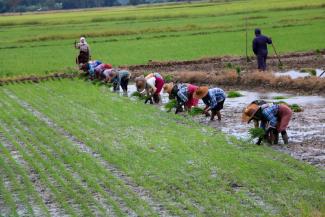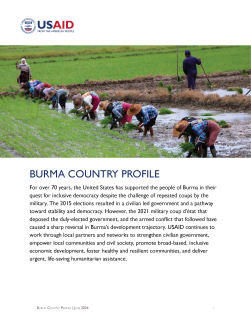For over 70 years, the United States has supported the people of Burma in their quest for inclusive democracy despite the challenge of repeated coups by the military. The 2015 elections resulted in a civilian led government and a pathway toward stability and democracy. However, the 2021 military coup d’état that deposed the duly-elected government, and the armed conflict that followed have caused a sharp reversal in Burma’s development trajectory. USAID continues to work through local partners and networks to strengthen civilian government, empower local communities and civil society, promote broad-based, inclusive economic development, foster healthy and resilient communities, and deliver urgent, life-saving humanitarian assistance.
Our Work
Passage of the 2022 Burma United for Rigorous Military Accountability (BURMA) Act underscores U.S. long-term commitment to the people of Burma and guides USAID/Burma programming in the midst of a political and humanitarian crisis. USAID protects human rights, supports democratic processes, builds resilience through economic and education opportunities, and improves access to life-saving and essential services for underserved and marginalized communities. USAID also improves health outcomes and mitigates health threats such as HIV, malaria, and tuberculosis.
Economic Growth
Once known as Asia’s “rice bowl,” Burma is experiencing food insecurity with over millions of people now requiring humanitarian assistance. USAID bolsters community resilience by helping people across Burma to sustain their livelihoods in the midst of a complex crisis. Development efforts address financial inclusion, strengthen market linkages, increase access to high-quality farming inputs, promote responsible and transparent business practices, and develop greater interconnectivity between communities.
Education
An educated population is vital for a future democratic Burma, but the coup has forced approximately 6 million students out of school and significantly worsened the quality of education. USAID partners with communities affected by the conflict to provide access to basic education, and supports young adults and promising leaders by providing scholarships across a wide array of education programs in universities throughout Asia and in the United States.
Global Health
Since the coup, regime actors have attacked and raided health facilities, cutting off access to health care for millions of people. After steady improvements over the previous decade, infectious diseases such as malaria and tuberculosis are once again on the rise, and a lack of basic health care services has led to preventable illness and death. USAID/Burma works in underserved communities to bolster access to health care, reduce maternal and child mortality, and combat transmissible diseases like HIV, malaria, and tuberculosis. USAID partners include local civil society organizations, to empower communities to advocate for their health and well-being.
Democracy and Human Rights
As the lead donor supporting Burma’s return to a democratic path, USAID works with a diverse group of pro-democracy activists, including political actors, journalists, human rights defenders, civil society organizations and governance and service providers of ethnic resistance organizations that strive to establish a democratically elected civilian government, and to establish a federal democratic state. Our programs reinforce democratic values and fundamental freedoms, promote civic engagement, strengthen independent media, and support the people of Burma who are working to build an inclusive, prosperous future for all.
Humanitarian Assistance
Humanitarian needs in Burma have significantly increased following the coup. The regime’s physical attacks on communities have reduced access to essential goods and services, limited livelihoods, and displaced millions of people. As the lead humanitarian donor, USAID provides life-saving assistance, including shelter and relief items, social protection, food and cash, water, sanitation, and hygiene, mobile health and nutrition, and food security and livelihoods to households and communities that have been displaced or affected by the conflict.


